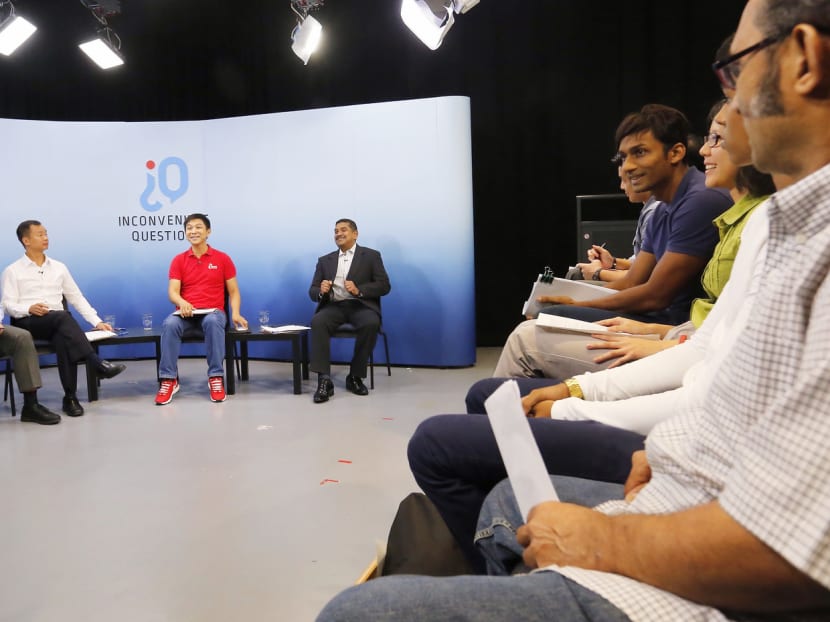Foreign talent scheme still proving controversial
SINGAPORE — It accounts for only 2.5 per cent of the 1,400 carded Singapore national athletes, but the Foreign Sports Talent (FST) scheme is still proving to be a controversial issue among Singapore’s sporting fraternity. In recent years, the call has sounded for an end to the FST scheme, particularly after Singapore’s successes at regional events.

(From left) Panellists Sport Singapore CEO Lim Teck Yin, Singapore Sailing Federation president Benedict Tan and Minister Tan Chuan-Jin at the dialogue yesterday. Photo: Ernest Chua
SINGAPORE — It accounts for only 2.5 per cent of the 1,400 carded Singapore national athletes, but the Foreign Sports Talent (FST) scheme is still proving to be a controversial issue among Singapore’s sporting fraternity. In recent years, the call has sounded for an end to the FST scheme, particularly after Singapore’s successes at regional events.
This includes the Republic’s recent success at the 28th SEA Games, in which its 747-strong athlete contingent posted the country’s best-ever performance at the biennial meet with a total of 259 medals — the most of all 11 participating countries — comprising 84 gold, 73 silver and 102 bronze.
Speaking at a dialogue at the University Town last night entitled “Singapore Sports — Ready to go Solo?” which was organised by sociopolitical site IQ, Sport Singapore CEO Lim Teck Yin, who was one of the panellists along with Singapore Sailing Federation president Benedict Tan and Minister for Social and Family Development and Singapore National Olympic Council president Tan Chuan-Jin, said it had to be viewed in perspective.
“The foreign talent scheme is more pronounced in certain sports, for netball you have one player, for table tennis there are more,” said Lim, who stressed that retired national table tennis player Wang Yuegu is an example of a FST athlete who has assimilated well into Singapore society.
“This is also reflective of the state of sports in the world, if you look at the world championships and Olympics, there are a lot of table tennis players born in China.”
Minister Tan added: “The foreign talent focus is always on table tennis ... but they have also inspired many young players to take up the sport. If we want to bring them in, it has to be suitable talent, and not use it as an easy way out. If it is, then we have lost the plot.”
The wide-ranging two-hour dialogue, which was chaired by IQ founder and editor-in-chief Viswa Sadasivan, also touched the role of the Singapore Sports School in producing talent, National Service as a factor in top male athletes’ sporting careers.
Ensuring what had to be done to Singapore’s remarkable performance at the 2015 SEA Games will not become a one-off, and the role that the Government, Sports School and institutions of higher learning can do to help that, was also discussed.
Building and sustaining a sporting culture also proved a hot topic yesterday, with many lauding the spirit and support shown by some 500,000 fans who turned out across the 31 venues during the recent June 5 to 16 SEA Games.
With about 39 per cent of Singapore’s 84 golds at the SEA Games won by current or former student-athletes from the Sports School, two-time silat world champion Sheik Alau’ddin urged the school to expand its six-year curriculum, which includes through-train programmes to tertiary institutions.
“I would like to see the sports school not only offer education to Secondary four or five and polytechnic,” he said. “Why not extend it right up to university, and they can create Olympic champions from the Sports School.”
Others, such as former sprinter U K Shyam and ex-national swimmer Mark Chay, called on the universities to improve on and emulate the United States’ National Collegiate Athletic Association’s competitive environment by attracting top athletic talents to local institutions to compete and train among the local athletes.
Added Lim: “By attracting world-class talents here and being in the system, it raises standards, and when you have real competition, they really level up. (Local) universities have been very forthcoming. But whether we create an (sporting) atmosphere or culture ... it’s whether we have a critical mass of athletes.”
While many ideas have been mooted and discussed to help Singaporean sportsmen attain success at the SEA Games and beyond, Minister Tan stressed that the onus for sporting success lies with Singaporeans.
“We provide the support system and so the options are exercised, but that last mile has to be walked by you (the people),” he said.
“It isn’t just the SEA Games that has allowed us to see this surge and we should take it further. Sports is at an exciting time, let’s see how we can ride this momentum, and how we can as Singaporeans contribute to that space.”








